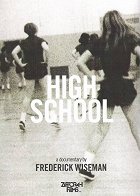Samenvattingen(1)
Frederick Wiseman verbleef bij voorkeur voor langere tijd op één plaats, zodat hij zich flink in een onderwerp kon vastbijten. Een ziekenhuis, een tbs-kliniek, de sociale dienst. In 1968 sluit hij zich op in een middelbare school in Philadelphia, waar hij de dagelijkse activiteiten van docenten, leerlingen en andere betrokkenen observeert. De speurende camera infiltreert in de lessen biologie, gymnastiek en typen -- op een ouderwetse typemachine! -- en legt oriënterende gesprekken en ouderavonden vast. Zoals altijd gemonteerd in een losse, non-narratieve stijl. Wiseman toont zich in High School vooral geïnteresseerd in de ideologische en politieke waarden die de school op de leerlingen overdraagt. Het pessimistische beeld dat High School schetst van het leven op een grootstedelijke school ("Jij zegt niets, je luistert alleen naar mij!") is sterk beïnvloed door de tijd waarin de film is gemaakt. Aan het eind van de jaren zestig -- het hoogtepunt van de Amerikaanse protestbeweging -- zagen veel maatschappijcritici scholen als de pijlers van de onrechtvaardige, gevestigde orde. Desondanks bestaan sommige gesignaleerde problemen tot op de dag van vandaag. De recente discussie over het dragen van hoofddoekjes in de klas geeft bijvoorbeeld aan dat leerlingen nog altijd niet helemaal vrij zijn in hoe ze zich willen kleden. (International Documentary Film Festival Amsterdam)
(meer)Recensie (2)
One year after the creation of this film, the famous philosopher and Marxist Louis Althusser published his most well-known essay, "Ideology and Ideological State Apparatuses," in France - and it does not take a genius to guess that the main ideological apparatus of modern times appeared to him to be none other than the school. A space of constantly circulating and seemingly imperceptible relationships of discipline, dominance, internalization of external norms, the fabrication of standardized "individuals" in the likeness of writing courses on typewriters - that is, individuals with only one form of communication; in the likeness of fashion courses for girls - that is, with only one form of self-presentation; in the likeness of lectures on sex education - that is, with only one form of intimacy. It is also necessary to remind some of the politically naïve people among us who imagine ideology as a centralized process of deformation led by evil priests (18th century) or totalitarian Nazi-Communists (20th century), that ideology is common to all social formations and serves as a kind of coordinate system in the likeness of cultural patterns - it also serves as orientation in the world and the self-regulation of society, and thus it is spread throughout the fabric of society and necessarily acquired by those who propagate it. Wiseman perfectly shows us this in the final scene with the teacher, who is moved by a letter from a former student who voluntarily went to Vietnam to fight for the safety of a free world. In Wiseman's film, the school is depicted as a self-affirming ideological mechanism of Western (capitalist) society in the late 1960s.
()
In this document, it is beautiful that it does not need any comment. Only the protagonists are left to speak. Wiseman captures basically ordinary school days, but thanks to how he edited individual scenes together and thanks to how the teachers are convinced that what they are doing is absolutely right, the film sounds extremely dark and shows that the children - at least at the given school - are not taught by educators, but by foolish fanatics.
()
